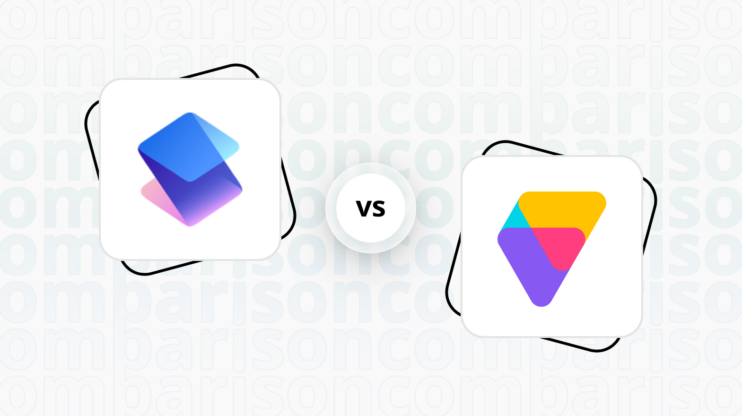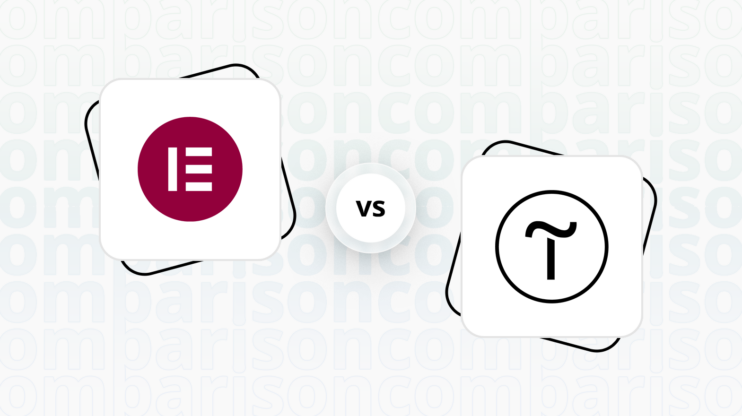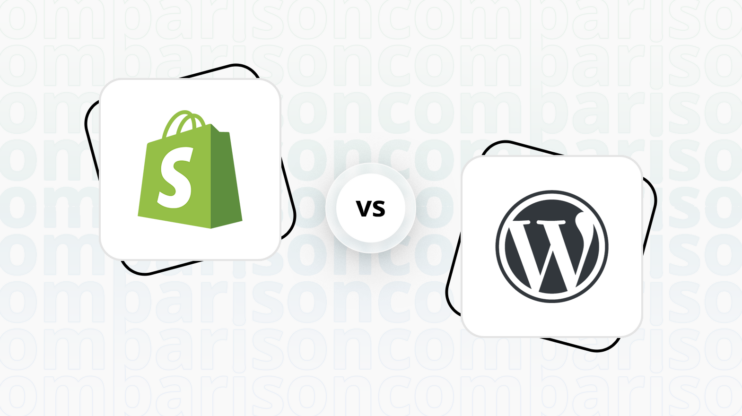Final verdict
Tilda and Webnode both offer user-friendly website building experiences, but they cater to slightly different needs.
-
Tilda (Overall Grade: 6.7/10)
is ideal for users who prioritize design and visual content. It offers a wide range of pre-designed blocks and templates, making it suitable for bloggers, small businesses, and digital marketers. Tilda excels in design functionalities and templates, providing a versatile tool for creating visually appealing websites. Its ecommerce features are comprehensive, and it integrates well with various services for analytics, email marketing, and payment solutions. However, some users have noted issues with stability and customer support. -
Webnode (Overall Grade: 6.5/10)
is a great option for beginners who want to create a simple website quickly and easily. It offers a straightforward drag-and-drop interface and a variety of customizable templates. Webnode is strong in ease of use and provides comprehensive learning resources. While its ecommerce features are more basic compared to Tilda, it offers good value for money, especially with its free and affordable paid plans. Webnode also excels in website speed optimization and security, making it a reliable choice for users looking for a hassle-free website building experience.

|

|
|
|---|---|---|
|
Design functionalities & templates |
8.6 |
7.1 |
|
Ease of use |
8.0 |
8.0 |
|
Ecommerce |
7.2 |
6.3 |
|
Website Editors |
8.0 |
7.3 |
|
Product testing options |
5.9 |
5.3 |
|
Price |
8.0 |
7.7 |
|
Hosting quality |
6.2 |
6.3 |
|
Website speed optimization |
4.9 |
6.1 |
|
Plugins and integrations |
7.6 |
6.8 |
|
Marketing features |
6.9 |
5.5 |
|
Customer support |
5.5 |
5.3 |
|
Security |
7.6 |
7.7 |
|
AI capabilities |
2.1 |
5.3 |
|
User Management |
7.3 |
6.9 |
Best for ecommerce
 7.2
7.2
 6.3
6.3
Verdict
: Tilda is better suited for those who need a more comprehensive ecommerce solution with advanced marketing tools, while Webnode is ideal for beginners looking for simplicity and ease of use.
-
Tilda
: Tilda offers a user-friendly platform with a range of ecommerce features, including product catalogs, payment gateways, and built-in CRM tools. It is designed for users who want to create visually appealing online stores without coding skills. Tilda’s advanced marketing tools, especially in SEO and analytics, make it a strong contender in the ecommerce space. However, when comparing Tilda vs Webnode, Tilda’s ecommerce capabilities are more robust, making it suitable for more serious online businesses. -
Webnode
: Webnode is a good option for beginners who want to create a simple website quickly and easily. It offers essential ecommerce features like shipping options, payment gateway integrations, and order management. While it may lack some of the advanced features found in Tilda, Webnode’s ease of use and straightforward interface make it a practical choice for small-scale ecommerce operations.
Best for informational & business websites
 8.4
8.4
 7.2
7.2
Verdict
: Tilda is the superior choice for creating visually appealing and professional-looking informational websites, thanks to its extensive design functionalities and templates. Webnode, while user-friendly and suitable for beginners, falls short in comparison to Tilda’s versatility and design capabilities.
-
Tilda
: Tilda excels in creating visually stunning and professional websites, making it ideal for bloggers, small businesses, and digital marketers. Its focus on typography and visual content, along with a wide range of customizable templates, allows users to create unique and engaging websites. Tilda’s integration with various services for analytics, email marketing, and payment solutions further enhances its versatility, making it a strong contender for informational and business websites. -
Webnode
: Webnode is a good option for beginners who want to create a simple website quickly and easily. Its drag-and-drop interface and customizable templates make it user-friendly, but it lacks the advanced design functionalities that Tilda offers. While Webnode provides essential features for creating and managing websites, it is better suited for users with basic needs and those who prioritize ease of use over design sophistication.
Detailed comparison
Design functionalities & templates
Design FunctionalitiesRepresents how well each platform allows for creative design and customization of websites.Score Components:
- Template Variety (30%): Range and quality of design templates.
- Customization (30%): Flexibility and options for design alterations.
- User Interface (20%): Ease and intuitiveness of the design process.
- Responsiveness (10%): Adaptability to different devices and screen sizes.
- Innovation (10%): Unique design features and tools.
 8.6
8.6
 7.1
7.1
🏆
Winner: Tilda.
Tilda offers a wider range of design functionalities and templates, making it a more versatile choice for users who want to create visually appealing and professional-looking websites.
Tilda offers a diverse selection of design templates that are suitable for various types of content, all crafted by professional designers. These templates emphasize gorgeous typography, minimalist blocks, and striking images. Users have the flexibility to modify any template significantly or even start from scratch, ensuring the final website can meet a wide range of design preferences and requirements.
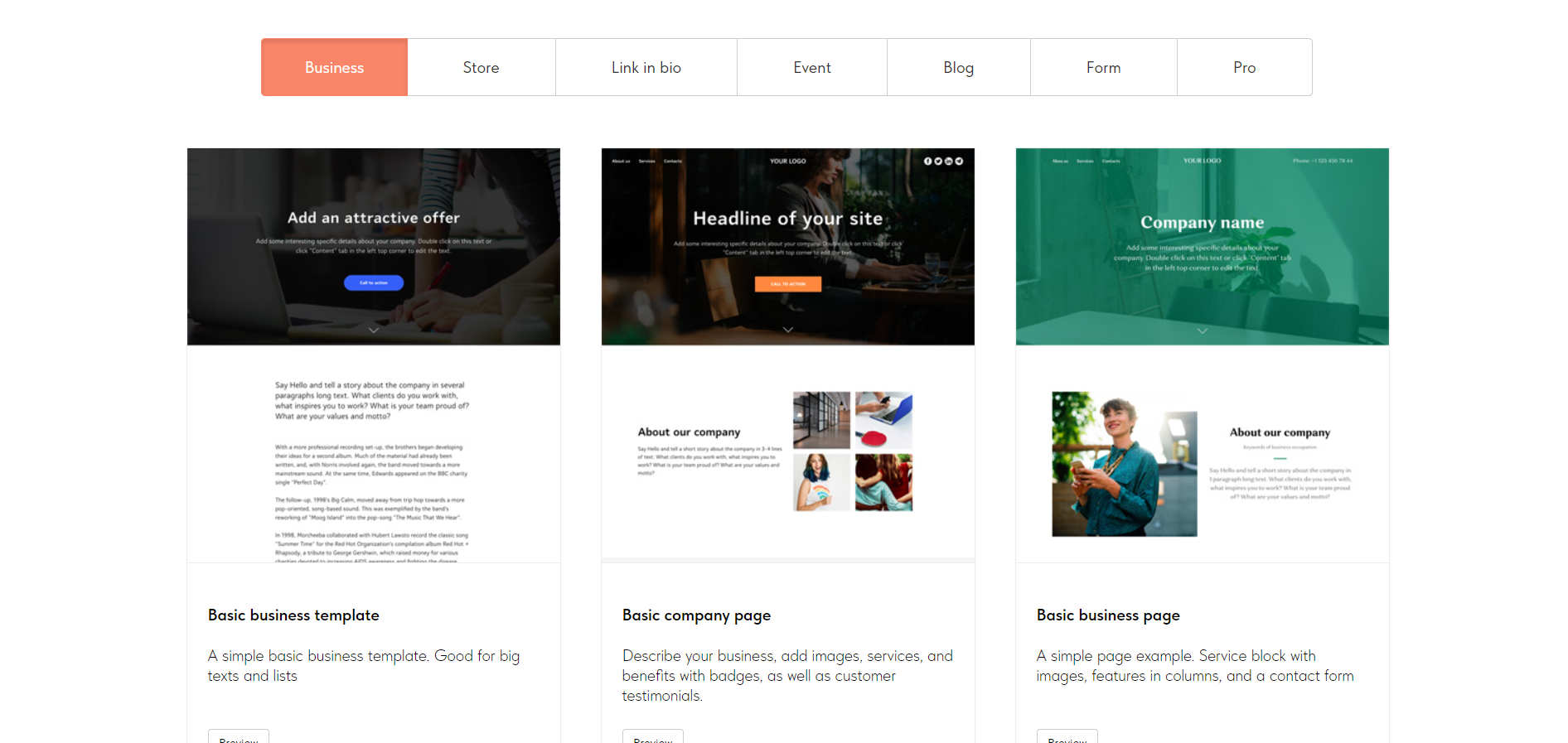
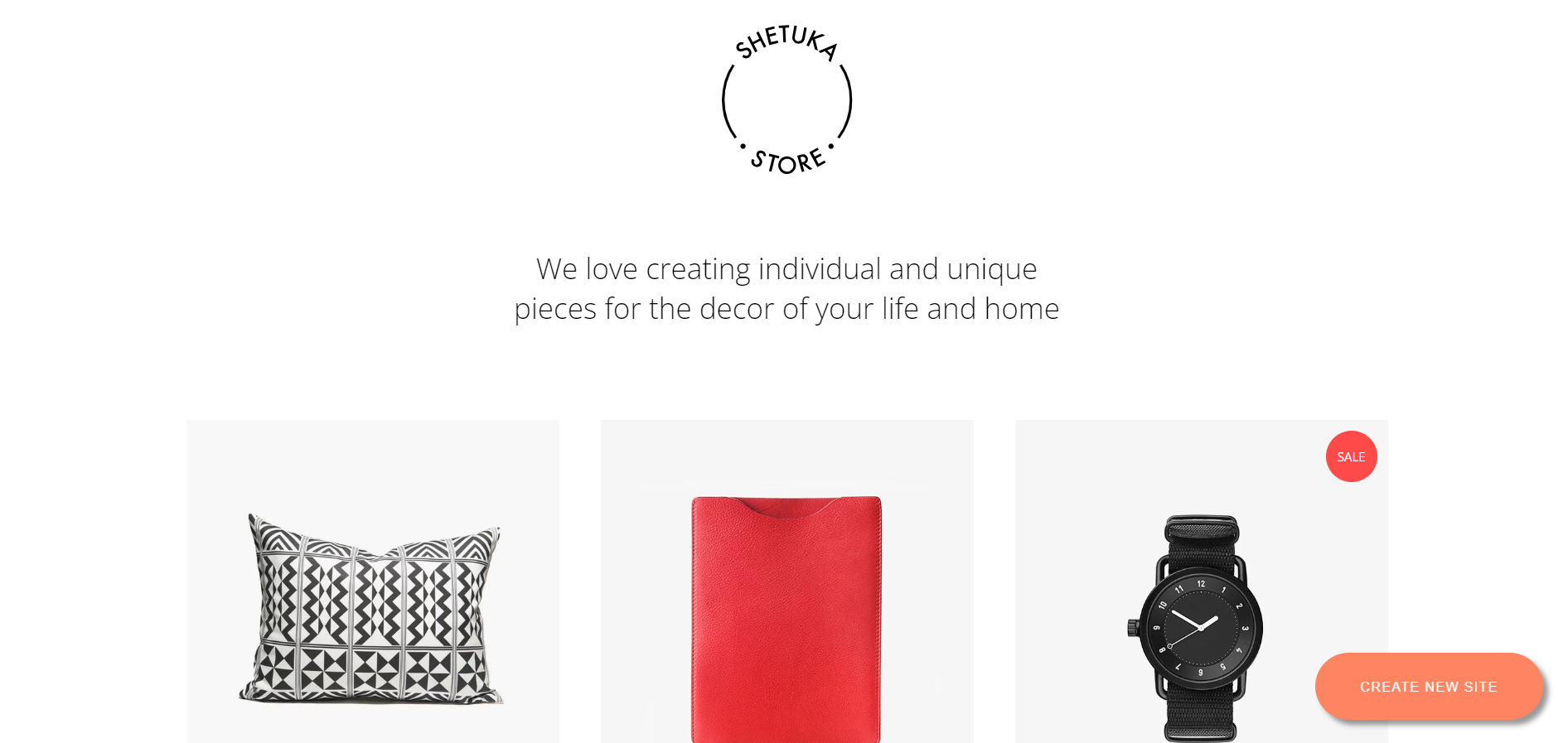
On the other hand, Webnode offers a variety of website templates designed for different purposes, from business and portfolios to restaurants and travel. These templates are customizable and responsive, ensuring they display well on any device. While an exact number isn’t available, Webnode provides a wide selection to cater to diverse website needs.
Get a head start on website creation with AI
Create a custom website tailored to your business needs 10X faster with 10Web AI Website Builder!
Ease of use
Ease of useReflects the platform’s overall user-friendliness.Score
Components:
- Learning curve (40%): Quickness and ease of getting started.
- Interface design (30%): Simplicity and intuitiveness of layout.
- User guidance (20%): Quality of tutorials and support.
- Flexibility (10%): Adaptability to various user skills.
 8.0
8.0
 8.0
8.0
🏆 Winner: Tie
. Both Tilda and Webnode score an 8.0 in ease of use, indicating that both platforms are user-friendly and accessible for beginners. Tilda is known for its intuitive drag-and-drop interface and a wide range of modern, responsive templates, while Webnode offers a straightforward interface and drag-and-drop functionality suitable for beginners without coding experience.
Learning Resources
🏆 Winner: Webnode
. While both platforms offer a variety of learning resources, Webnode provides a more comprehensive set of resources, including official documentation, video tutorials, knowledge bases, and community forums. Tilda also offers detailed articles, tutorials, and video guides, but some reviews suggest that customer support could be improved.
For ecommerce
EcommerceMeasures the platform’s effectiveness in supporting online business activities.Score Components:
- Ecommerce themes and templates (20%): Variety and design of templates.
- Product management (25%): Ease of managing and organizing products.
- Payment options (25%): Variety and convenience of payment methods.
- Ecommerce features (20%): Features for managing an ecommerce store.
- Integration (10%): Compatibility with external e-commerce tools and services.
 7.2
7.2
 6.3
6.3
Tilda and Webnode both offer ecommerce capabilities, but they cater to different needs and preferences. Tilda is a user-friendly platform with comprehensive management features, making it a solid choice for those looking to quickly set up an online store. On the other hand, Webnode is a good option for beginners who want to create a simple website quickly and easily, but its ecommerce features may be limited compared to other platforms.

|

|
|
|---|---|---|
|
Ecommerce themes and templates |
6.5 |
6.5 |
|
Product page customization |
7.0 |
7.0 |
|
Payment processing and commissions |
7.5 |
6.8 |
|
POS capabilities |
0.0 |
4.0 |
|
Payment gateways |
7.8 |
7.0 |
|
Product numbers |
6.0 |
5.5 |
|
Additional ecommerce features |
6.5 |
6.0 |
Tilda ecommerce features:
- Product Catalogs and Inventory management
- Payment Gateways integration
- Shipping options
- Order management
- Built-in CRM and marketing tools
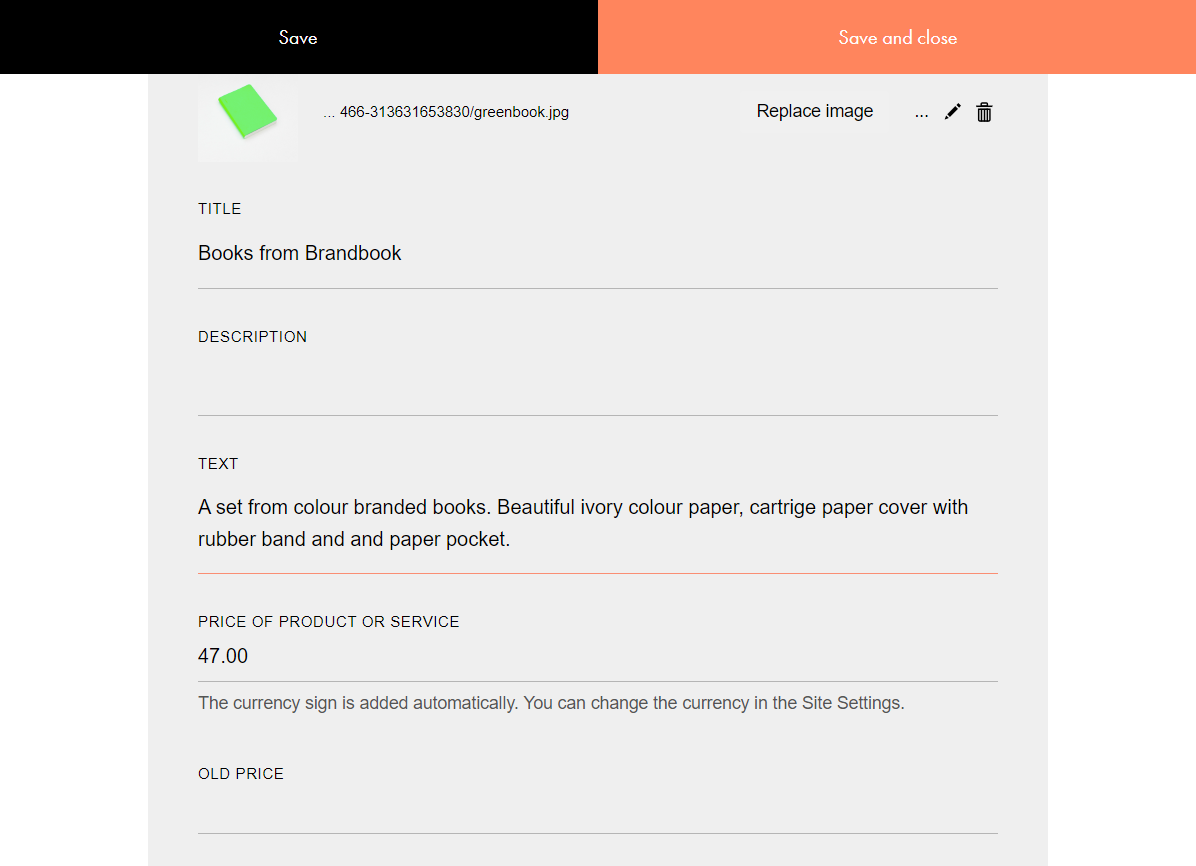
Webnode ecommerce features:
- Shipping options
- Payment gateway integrations
- Order management
- Coupons and discounts
Ecommerce themes & templates
Tilda allows users to build their eCommerce sites using around 20 ready-made online store templates, emphasizing ease of use and the ability to create a store without needing coding or web design skills. Webnode, on the other hand, offers ecommerce-specific templates designed for creating online stores, though the exact number of templates available may vary over time.
Product page customization
Tilda enables a wide range of customizations for product pages in online stores, including the design, e-commerce functionalities, and integration with external services. Webnode provides users with extensive customization options for product pages, allowing for the creation of visually appealing and informative displays.
Payment processing
The Tilda website builder supports a variety of popular payment systems such as Stripe, PayPal, and 2Checkout, allowing for easy integration to accept online payments. Tilda does not impose additional transaction fees beyond those of the payment gateways themselves. Webnode website builder supports various payment gateways, including popular options like PayPal and Stripe, for online transactions. While Webnode itself doesn’t charge commissions on transactions, payment gateways may have their own fee structures.
Website Editors
Website EditorsEvaluates the platforms’ website building and editing capabilities.Score Components:
- Customization tools (40%): Range and power of editing features.
- Editor usability (30%): User experience within the editor.
- Design flexibility (20%): Freedom in layout and design changes.
- Update and maintenance ease (10%): Simplicity of updating and maintaining the site.
 8.0
8.0
 7.3
7.3
🏆
Winner: Tilda
. Tilda, with a score of 8.0, offers a user-friendly, block-based design approach that simplifies the process of creating websites without requiring in-depth coding knowledge. It features advanced customization options through its Zero Block feature, allowing for detailed control over design elements for those needing more specific layouts. The platform supports responsive design, ensuring websites are optimized for all devices, and includes built-in SEO tools, analytics, and a range of integrations with third-party services for extended functionality.
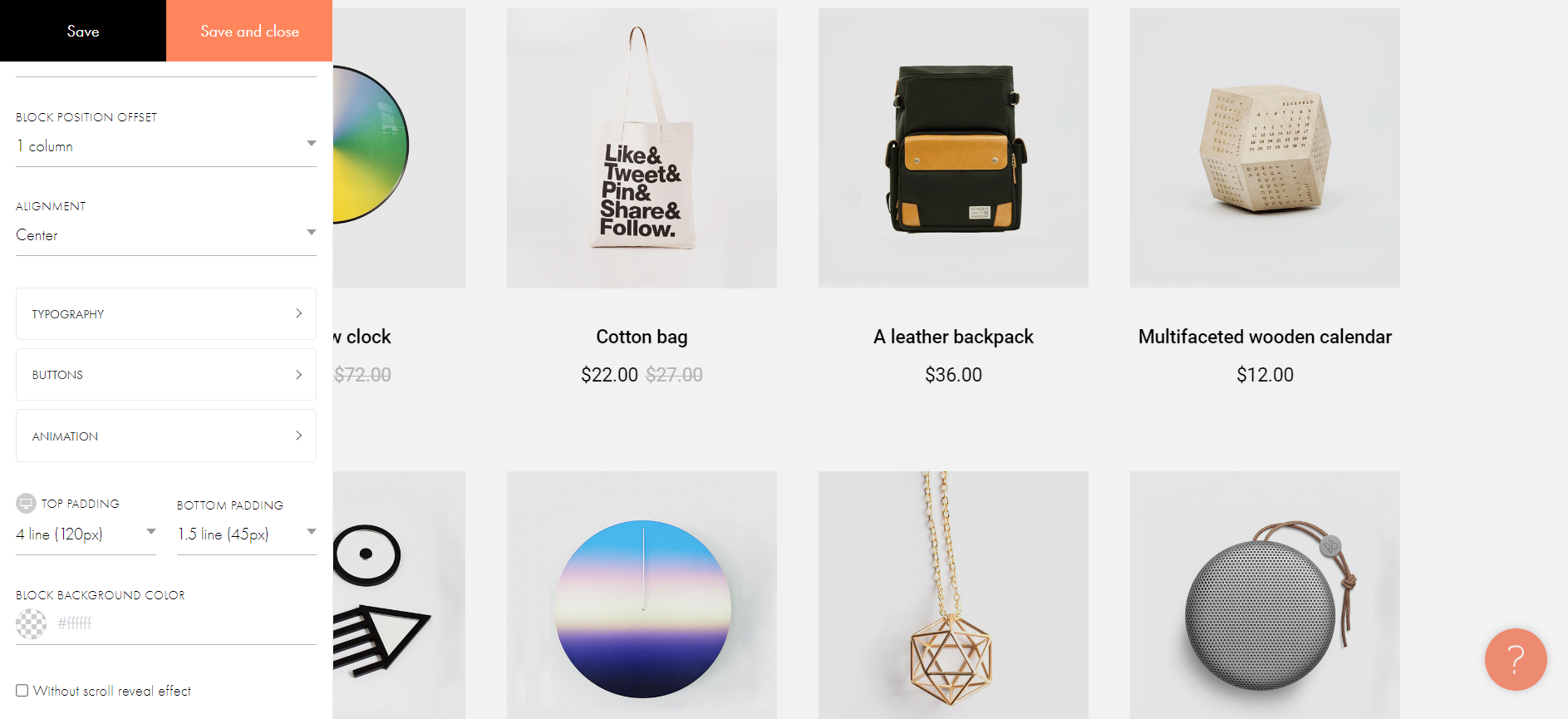
Webnode’s website builder, scoring 7.3, features a user-friendly drag-and-drop interface with customizable templates, enabling users to easily create professional-looking websites without coding skills. The editor offers responsive design capabilities and multilingual support, catering to diverse audiences across different devices and languages. Built-in features such as SEO tools, e-commerce functionality, and analytics integration empower users to optimize their websites for search engines, sell products online, and track performance metrics effectively.
Mobile editor/app
 5.5
5.5
 5.5
5.5
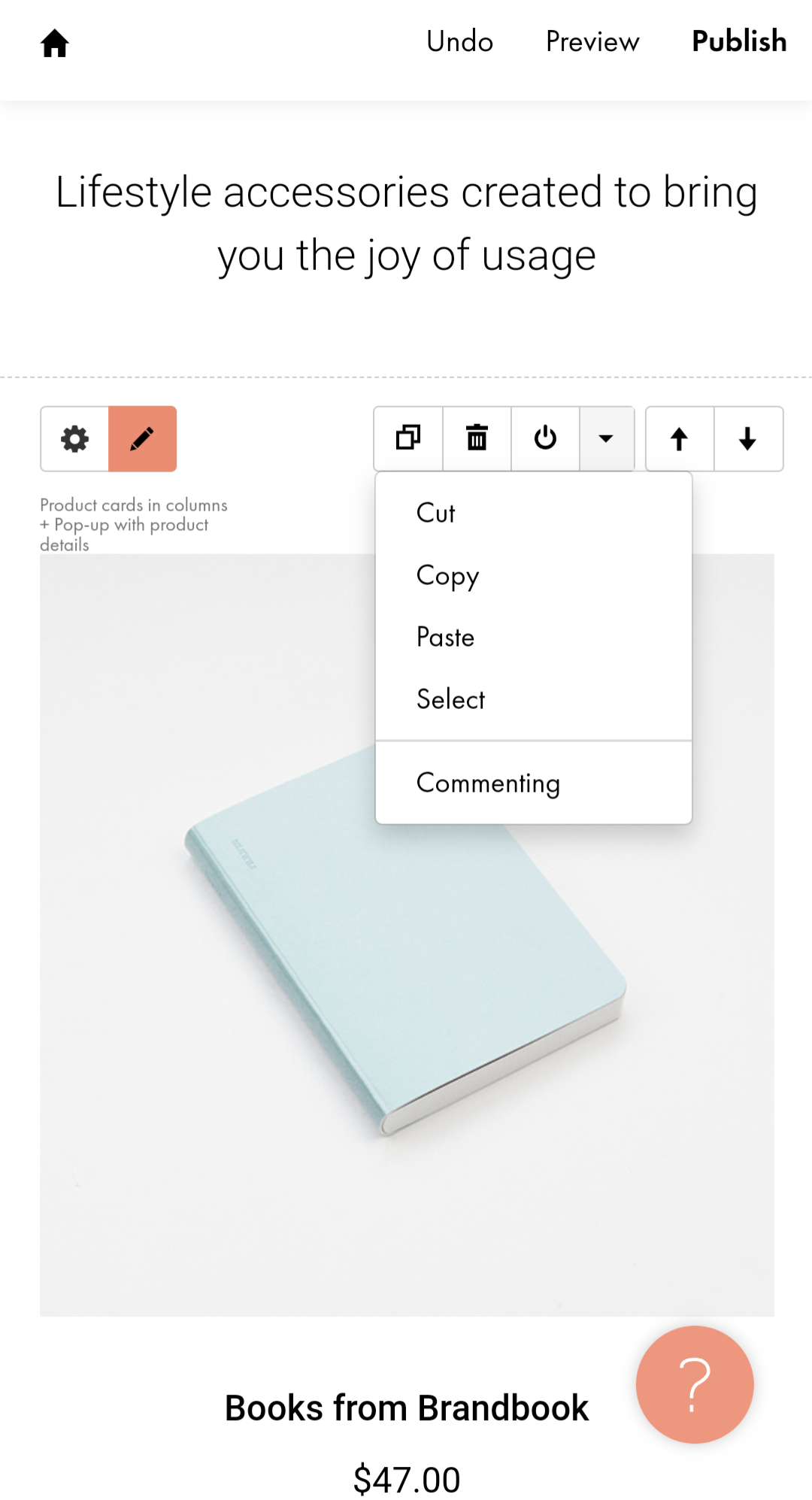

🏁
Draw: Tilda and Webnode
. Both Tilda and Webnode do not offer a dedicated mobile editor app. Instead, they allow users to manage and edit their websites using the mobile browser version of the editor. This means that users can make changes to their websites on the go, but the experience might not be as smooth or feature-rich as using a dedicated mobile app.
Tilda and Webnode have the same score for their mobile editors, indicating that they offer similar functionalities. However, it’s worth noting that the mobile browser version of the editor might come with certain limitations compared to the desktop version. Therefore, if you prefer to do a lot of editing on your mobile device, you might want to consider this factor when choosing between these two website builders.
Product testing options
Product Testing OptionsAssesses the options for trying out platform features before commitment.Score Components:
- Trial quality (40%): Extent and usefulness of the trial or free version.
- Feature accessibility (30%): How many features are available to test.
- Trial duration (20%): Length of the trial period.
- Ease of transition (10%): Smoothness of moving from trial to paid plans.
 5.9
5.9
 5.3
5.3
Overall Result
:
Tilda wins
. Tilda scores 5.9, slightly higher than Webnode’s 5.3. Both Tilda and Webnode offer a free version and allow testing of some premium features. However, Webnode has an edge with its 15-day money back guarantee, which Tilda does not offer.

|

|
|
|---|---|---|
|
Free Plan |
Yes | Yes |
|
Trial Duration |
No | No |
|
Testing Premium Features |
Some features with free plan | Some features with free plan |
|
Money Back Guarantee |
No |
15-day money back guarantee |
Price
PriceLooks at the cost-effectiveness and value for money of each platform.Score Components:
- Plan value (40%): What each pricing tier offers.
- Transparency and clarity (30%): Clearness of pricing structures.
- Flexibility of plans (20%): Range of options to suit different budgets.
- Hidden costs (10%): Additional expenses not included in the plan.
 8.0
8.0
 7.7
7.7
Tilda and Webnode both offer competitive pricing, with Tilda scoring slightly higher in terms of price.

|

|
|
|---|---|---|
|
Free |
Free ($0/month): Tilda’s Free plan allows for 1 website with up to 50 pages per website and 50 MB of space per project. It includes a free subdomain on tilda.ws, responsive design on all devices, basic animations, a built-in image and icon library, and Tilda CRM. |
No offering at this amount. |
|
$0-$10 |
No offering at this amount. |
LIMITED ($5.50/month): Basic plan, 200 MB storage, attach domain, website statistics, up to 5 form fields, last 30 days backup. This plan allows to manage 1 website with unlimited number of pages. Value for price: 3.0 |
|
$10-$20 |
No offering at this amount. |
MINI ($10.00/month): All essentials for a simple website, 1 GB storage, 3 GB bandwidth, website statistics, 1 email account. This plan allows to manage 1 website with unlimited number of pages. Value for price: 4.5 |
|
$20-$30 |
Personal ($15/month): The Personal plan offers 1 website with up to 500 pages and 1 GB of space. It includes all features of the Free plan plus the ability to connect a custom domain, advanced animations, full access to the Block Library, analytics, SEO tools, and online store capabilities. Value for price: 7.5 |
STANDARD ($16.90/month): For starting an online store, 3 GB storage, 10 GB bandwidth, 20 email accounts, basic store features. This plan allows to manage 1 website with unlimited number of pages. Value for price: 6.0 |
|
$30+ |
Business ($25/month): The Business plan expands capabilities to 5 websites per account, each with up to 500 pages and 1 GB of space, including source code export and API access. It builds upon the Personal plan features with additions suitable for more extensive business needs. Value for price: 9.0 |
PROFI ($26.50/month): Professional websites, 7 GB storage, unlimited bandwidth, 100 email accounts, full online store capabilities. This plan allows to manage 1 website with unlimited number of pages. Value for Price: 7.5 |
location. As a result in rare cases the prices displayed here can differ from the ones you see on their
websites.
Hosting quality
Hosting
qualityExamines the reliability and performance of the hosting solutions.Score Components:
- Uptime (40%): Consistency and reliability of website availability.
- Speed (30%): Loading times and performance.
- Bandwidth and storage (20%): Sufficiency of resources provided.
- Data centers (10%): Quality and distribution of hosting infrastructure.
 6.2
6.2
 6.3
6.3
🏆
Winner: Webnode
Both Tilda and Webnode offer cloud hosting services, but Webnode edges out with a slightly higher hosting quality score and offers more bandwidth on its plans. Neither platform provides an uptime guarantee or discloses the locations of their data centers, which is a downside for both.

|

|
|
|---|---|---|
|
Do they offer hosting? |
Yes, up to 1GB storage |
Yes, from 1GB to unlimited bandwidth with automated backups on higher plans |
|
Type of hosting: |
Cloud Hosting |
Not disclosed |
|
Uptime: |
99.9% |
99.6% |
|
Uptime Guarantee: |
No |
No |
|
Data Centers: |
Not disclosed |
Not disclosed |
Website Speed Optimization
Website Speed OptimizationEvaluates optimization of website loading timesScore Components:
- PageSpeed Score (30%): Google’s score indicating performance optimization.
- Loading Time (30%): The average time until a website is fully interactive.
- Mobile Optimization (15%): Optimization effectiveness for mobile devices.
- Resource Optimization (15%): Optimizing images, scripts, and other heavy resources.
- CDN Usage (10%): Use of CDN to enhance speed across geolocations.
 4.9
4.9
 6.1
6.1
🏆 Winner: Webnode
Both Tilda and Webnode prioritize website speed optimization, but Webnode has a slight edge due to its more comprehensive optimization strategies.

|

|
|
|---|---|---|
|
Focus |
Lazy Loading, Image Optimization |
Code Minification, Image Optimization, Caching |
|
Performance Tools |
Not specified |
Not specified |
|
Key Strategies |
Lazy Loading, Image Optimization |
Code Minification, Image Optimization, Caching |
|
Load Times |
Varies depending on optimization and website complexity |
Varies depending on optimization |
|
Page Speed Scores Range |
Not specified |
Not specified |
|
Core Web Vitals Improvement |
Not specified |
Not specified |
Tilda, a web-based platform designed for creating websites, landing pages, and online stores, focuses on lazy loading and image optimization as its key strategies for speed optimization. However, it does not provide specific information on load times, PageSpeed score ranges, or Core Web Vital improvements.
On the other hand, Webnode, a website builder that uses a drag-and-drop interface, employs a more comprehensive approach to speed optimization. It focuses on code minification, image optimization, and caching. Like Tilda, Webnode does not provide specific information on load times, PageSpeed score ranges, or Core Web Vital improvements. However, its broader range of optimization strategies gives it a slight edge over Tilda in terms of website speed optimization.
Get a head start on website creation with AI
Create a custom website tailored to your business needs 10X faster with 10Web AI Website Builder!
Plugins and integrations
Plugins and integrationsMeasures the range and effectiveness of additional plugins and integrations.Score Components:
- Variety of options (40%): Range of available add-ons.
- Integration smoothness (30%): Ease of integrating plugins into the site.
- Quality of plugins (20%): Functionality and reliability of the options.
- Custom integration capabilities (10%): Support for custom or third-party integrations.
 7.6
7.6
 6.8
6.8
🏆 Winner: Tilda.
With a score of 7.6, Tilda offers a diverse range of integrations that enhance the functionality of websites created on its platform. It supports popular payment processors, integrates with various services for forms, and connects with Google Analytics and Google Tag Manager for in-depth website analytics. Webnode, scoring 6.8, also supports a variety of plugins/integrations developed by Elfsight, covering a wide range of applications including social media, reviews, e-commerce, chats, and forms. However, Tilda’s integrations offer more versatility and sophistication, making it the winner in this category.

Marketing Features
Design FunctionalitiesRepresents how well each platform allows for creative design and customization of websites.Score Components:
- Template Variety (30%): Range and quality of design templates.
- Customization (30%): Flexibility and options for design alterations.
- User Interface (20%): Ease and intuitiveness of the design process.
- Responsiveness (10%): Adaptability to different devices and screen sizes.
- Innovation (10%): Unique design features and tools.
 6.9
6.9
 5.5
5.5
🏆
Overall Winner: Tilda
. Tilda stands out for its more advanced marketing tools, especially in SEO and analytics. Webnode is strong in social media integration and offers ads and promotions features, which Tilda lacks.

|

|
|
|---|---|---|
|
SEO Tools |
|
|
|
Email Marketing |
|
|
|
Blogging |
|
|
|
Social Media Integration |
|
|
|
Analytics and Reporting |
|
|
|
Ads and Promotions |
|
|
Customer Support
Customer supportEvaluates the quality and availability of support options.Score Components:
- Response time (40%): Speed of support responses.
- Support quality (30%): Effectiveness and helpfulness of the support.
- Availability (20%): Range of support channels (phone, chat, email).
- Resource richness (10%): Quality of self-help and educational materials.
 5.5
5.5
 5.3
5.3
🏆 Winner: Tilda
. In the Tilda vs Webnode comparison, Tilda edges out Webnode with a slightly higher customer support score. Tilda offers email support and a comprehensive Help Center filled with articles and tutorials, which can be very useful for users seeking self-help options. However, the lack of specified support hours may be a drawback for some users.
Webnode, on the other hand, provides customer support in over 20 languages and aims to respond to inquiries within 24 hours during weekdays. While email support is the primary channel, premium users benefit from priority phone support. Despite these features, the absence of live chat and limited availability to weekdays may limit the immediacy of support for Webnode users.
Security
SecurityLooks at the platforms’ security measures and data protection.Score Components:
- Data protection (40%): Safeguards for user and customer data.
- SSL and encryption (30%): Implementation of secure connections.
- Compliance (20%): Adherence to industry security standards.
- Regular updates (10%): Frequency of security updates and patches.
 7.6
7.6
 7.7
7.7
🏆
Winner: Webnode
. Webnode edges out Tilda with a slightly higher security score. Webnode offers a variety of security measures, including a Premium Site Security add-on with IP Filters, Form Protection, and Malware Scanning for users with a Premium Plan. All Webnode sites are automatically secured with HTTPS, ensuring safe browsing for visitors. Additionally, the platform supports GDPR compliance through consent fields in forms and a cookie consent bar, alongside offering restricted access to pages through membership registration.
Although it may not offer the same level of specialized ecommerce security features as Webnode, Tilda is committed to maintaining a secure platform for all types of websites. This includes GDPR compliance and enhances the privacy and security of websites created with its platform. These include features for cookie consent, privacy policies, GDPR-friendly forms, and options for managing data retention and deletion. Additionally, Tilda provides built-in security features such as DDoS prevention and HTTPS encryption to safeguard user data.
AI Capabilities
AI capabilitiesMeasures the effectiveness of AI-driven features and tools.Score Components:
- Automation efficiency (40%): Impact of AI on streamlining processes.
- Personalization (30%): AI-driven customization for users or customers.
- AI-Assisted design (20%): Role of AI in website design and functionality.
- Data analysis (10%): Use of AI in interpreting user data and analytics.
 2.1
2.1
 5.3
5.3

|

|
|
|---|---|---|
|
AI Builder |
|
Webnode AI builder streamlines the website creation process |
|
AI Ecommerce Features |
|
|
|
AI Content Generation |
Tilda’s AI generates website content |
|
|
Additional AI Features |
|
|
🏆 Winner: Webnode
. With a score of 5.3, Webnode’s AI capabilities are more advanced than Tilda’s, which scored 2.1. Webnode’s AI builder is an innovative tool that simplifies the website creation process, making it accessible and efficient for users regardless of their technical expertise.
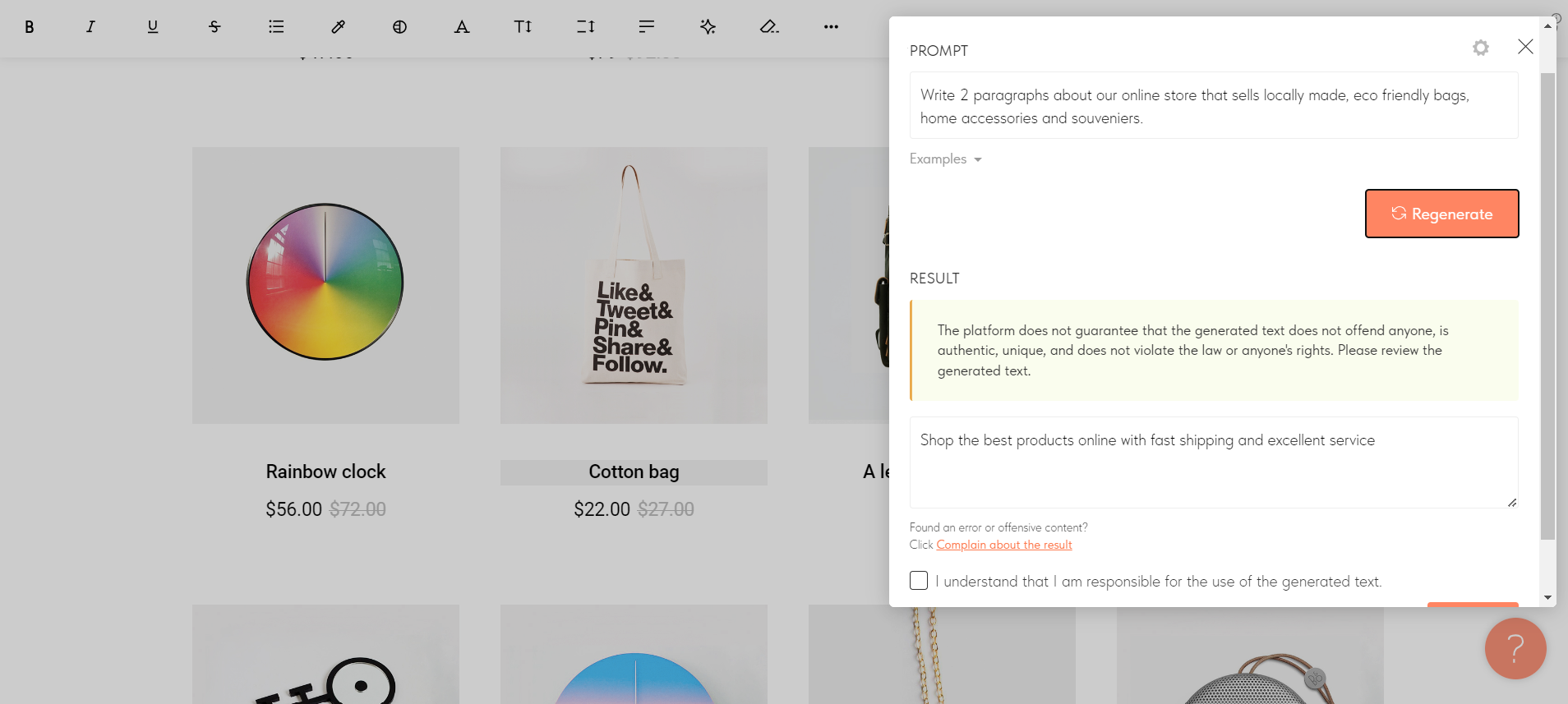
Tilda, on the other hand, does not have an AI builder or AI ecommerce features. However, it does have an AI feature for generating website content, which can be a useful tool for users who need assistance with content creation.
User Management
User ManagementAssesses the platforms’ capabilities in managing user roles, permissions, and accessibility.Score Components:
- Role Customization (40%): Flexibility in creating and defining user roles and
permissions. - Ease of Management (30%): User interface and tools for managing users.
- Access Control (20%): Effectiveness of access control measures for different user
levels. - Scalability (10%): Ability to manage a growing number of users efficiently.
 7.3
7.3
 6.9
6.9
🏆 Winner: Tilda
. Both Tilda and Webnode allow multiple users to manage and edit a website, but they differ in their approach to user roles and access levels.
- Tilda’s Collaborators feature allows adding teammates with either Full or Limited access. Full access enables collaborators to edit, publish, delete pages, view requests and statistics, and make changes to built-in website services. Limited access allows the project owner to specify what actions the collaborator can perform. This feature is available as a premium offering, and adding more collaborators requires additional payment, with costs adjusted based on previously paid periods. It applies to the entire account, not individual projects, and collaborators can be managed or replaced through the Site Settings.
- Webnode allows multiple users to manage and edit a website, but the exact number vary depending on the subscription plan you choose. Generally, the free version of Webnode provides limited user access for management and editing, while premium plans offer more flexibility, including the ability to add multiple users with different roles and permissions.
Webnode User Roles and Access Levels:
| Role | Description | Access Highlights |
|---|---|---|
| Website Owner | The individual or entity that owns the Webnode website. | Full access: can modify site structure, design, content, and manage user roles. |
| Administrator | Users with administrative privileges assigned by the website owner. | Nearly full access, including content management, and some settings adjustments. |
| Editor | Users tasked with creating, editing, and publishing content. | Access to add and edit content, blog posts, and pages, but cannot alter design. |
| Contributor | Users who can contribute content but cannot publish it. | Can draft content but need approval from an Editor or Administrator to publish. |
| Viewer/Visitor | Individuals who visit the website without any editing permissions. | Can view the public website and interact through comments or contact forms. |
| E-commerce Manager | Specifically for websites with an e-commerce component, managing products. | Can add, edit, and manage products, orders, and customer interactions. |
Additional Features

|

|
|
|---|---|---|
|
SSL Certificate |
|
|
|
Custom Domain |
|
|
|
Free Custom Domain Included |
|
|
|
International Domains |
|
|
|
Mobile Responsive |
|
|
|
Page Speed |
|
|
|
Website Builder Mobile App |
|
|
|
Convert a Website To An App |
|
|
|
Website Analytics |
|
|
|
Multilingual Sites |
|
|
|
Multiple Users |
|
|
User Feedback
Tilda Publishing receives varied feedback from users, highlighting its strengths in offering a no-code, customizable website building experience with features like Zero Block for personalization and easy backend setup. Users appreciate its affordability, user-friendly interface, and responsive customer support. However, criticisms include buggy font customization, limited design elements, and instability in some of its features. Despite these drawbacks, many find Tilda beneficial for creating professional websites quickly and managing multiple sites under one plan, although some users advise caution due to issues with stability and customer support.
User feedback on Webnode highlights its ease of use, rapid website creation capabilities, and the wide range of templates available, making it a popular choice for individuals and businesses seeking an intuitive web development platform. While praised for its user-friendly interface and quick setup, including domain purchase and application, some users express a desire for more flexibility and customization options, especially in themes and e-commerce features. Comparatively, it falls short on advanced functionalities such as SEO tools and widgets offered by competitors like WordPress. Customer service experiences vary, with some users facing challenges in getting support for email hosting and analytics integration. Overall, Webnode is celebrated for its ability to accommodate users with little to no coding knowledge, offering an accessible solution for creating professional websites, though it may not fully meet the needs of those requiring more complex site features or dedicated customer support.
The making of this blog
We followed a clear, step-by-step process to write and research this article.
FAQ
Which platform is better for beginners, Tilda or Webnode?
Can I use Tilda and Webnode for ecommerce?
How do Tilda and Webnode compare in terms of design flexibility?
What are the main differences in pricing between Tilda and Webnode?
Which platform offers better customer support, Tilda or Webnode?
Are Tilda and Webnode secure platforms for building websites?
Which platform is better for SEO and marketing features?
Do Tilda and Webnode support AI capabilities?










